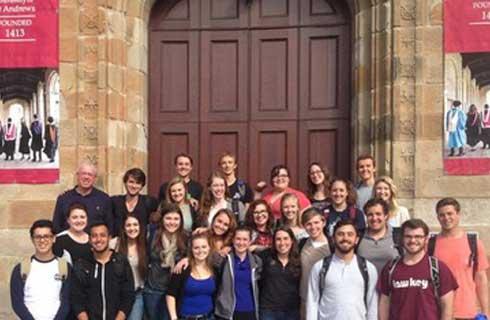Doctor of Philosophy in Oral Health Research - Cancer

学历文凭
Ph.D.

专业院系

开学时间

课程时长

课程学费

国际学生入学条件
Graduation with a Bachelor’s degree or Master’s degree from an accredited college or university, with a degree in a discipline that provides an appropriate background for graduate-level study in oral biology e.g. biology, chemistry, bioengineering, dentistry
or
Graduation with a dental degree (B.D.S. or D.D.S) from an accredited college or university
A minimum GPA of 3.0 on a 4.0 scale or higher is required.
Applicants whose native language is not English must submit satisfactory scores from a standardized test commonly used and deemed appropriate for evaluation of English language proficiency, such as the TOEFL. These scores should be 80 minimum for internet based tests, 213 minimum for computer based tests and 550 minimum for paper based tests.
Personal statements, which should include: long-term career goals to assess reasons behind the candidate’s application, how a Ph.D. in biomedical science helps achieve those goals, the factors motivating a career in research, research experience, including dates, places and duration
A current resume or curriculum vita is required
Three letters of recommendation that speak to the scientific competency and experience of the applicant
The university minimum IELTS score requirement is 6.5.
or
Graduation with a dental degree (B.D.S. or D.D.S) from an accredited college or university
A minimum GPA of 3.0 on a 4.0 scale or higher is required.
Applicants whose native language is not English must submit satisfactory scores from a standardized test commonly used and deemed appropriate for evaluation of English language proficiency, such as the TOEFL. These scores should be 80 minimum for internet based tests, 213 minimum for computer based tests and 550 minimum for paper based tests.
Personal statements, which should include: long-term career goals to assess reasons behind the candidate’s application, how a Ph.D. in biomedical science helps achieve those goals, the factors motivating a career in research, research experience, including dates, places and duration
A current resume or curriculum vita is required
Three letters of recommendation that speak to the scientific competency and experience of the applicant
The university minimum IELTS score requirement is 6.5.
IDP—雅思考试联合主办方

雅思考试总分
6.5
- 雅思总分:6.5
- 托福网考总分:80
- 托福笔试总分:550
- 其他语言考试:The PTE is also accepted with a minimum score of 65
CRICOS代码:
申请截止日期: 请与IDP联系 以获取详细信息。
课程简介
The focus of cancer research in the Philips Institute is to gain understanding of fundamental genetic and cellular mechanisms that contribute to the formation of cancer and to exploit this understanding for therapeutic gain. In order to do this, we employ a variety of techniques and approaches including bioinformatics, molecular and cellular biology, pharmacogenetics and animal modeling. The ultimate goal of research within the Institute is to provide novel diagnostics and therapeutics that will help in the battle against cancer. While head and neck cancer is a focus for the Institute there is also research being carried out on breast and lung cancer along with neuroblastoma, the underlying genetic lesions that result in cancer formation make focusing cancer research as a tissue specific disease redundant. The insights that are being made in all of the different cancers being investigated are being used to study head and neck cancer with the goal of developing novel therapeutic approaches for this disease. In recent years oropharyngeal (the middle part of the throat that includes the base of the tongue, the tonsils, the soft palate and walls of the pharynx) cancer incidence is on the increase due to an epidemic of human papillomavirus oropharyngeal cancers, this is the only major type of cancer incidence on the increase in the developed world. There are currently no diagnostics or specific treatments for this epidemic and developing such tools using bioinformatic, genetic, and molecular and cellular biology approaches is a high priority for the Institute. This work is done in collaboration with our clinical colleagues Laurence Dinardo, M.D., F.A.C.S., chair of the VCU Department of Otolarygology, and Adele Kraft, M.D. in the VCU Department of Pathology.
相关申请
 预科
预科 奖学金
奖学金 实习机会
实习机会 在校学习
在校学习 跨境学习
跨境学习 校园授课-线上开始
校园授课-线上开始 在线/远程学习
在线/远程学习
开学时间&学费
学费信息仅供参考,请与IDP联系以获取详细信息
| 开学时间 | 时长 | 学费 | 地点 |
|---|---|---|---|
| 暂无 | 暂无 | 暂无 | 暂无 |
本校相关课程

系统建模与分析哲学博士
学历文凭
Ph.D.
开学日期
课程费用总额


Doctor of Philosophy in Social Work
学历文凭
Ph.D.
开学日期
课程费用总额


Doctor of Philosophy in Social and Behavioral Sciences
学历文凭
Ph.D.
开学日期
课程费用总额


康复与运动科学哲学博士-运动生理学
学历文凭
Ph.D.
开学日期
课程费用总额


Doctor of Pharmacy
学历文凭
Ph.D.
开学日期
课程费用总额


Doctor of Philosophy in Pharmaceutical Sciences - Medicinal Chemistry
学历文凭
Ph.D.
开学日期
课程费用总额

其他相关课程

Master of Arts in Global Governance
 滑铁卢大学
滑铁卢大学学历文凭
Masters Degree
开学日期
课程费用总额


卫生研究(荣誉)理学学士
 滑铁卢大学
滑铁卢大学学历文凭
Bachelor Degree with Honours
开学日期
课程费用总额


社区卫生和流行病学理学硕士
 达尔豪斯大学
达尔豪斯大学学历文凭
Masters Degree
开学日期
课程费用总额


健康科学学士
 达尔豪斯大学
达尔豪斯大学学历文凭
Bachelor Degree
开学日期
课程费用总额


性别与妇女研究文学士学位
 达尔豪斯大学
达尔豪斯大学学历文凭
Bachelor Degree
开学日期
课程费用总额


土著研究哲学博士
 特伦特大学
特伦特大学学历文凭
Ph.D.
开学日期
课程费用总额









 美国
美国
